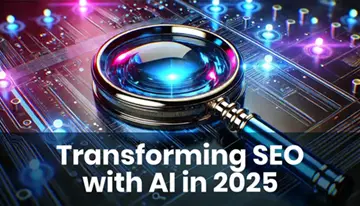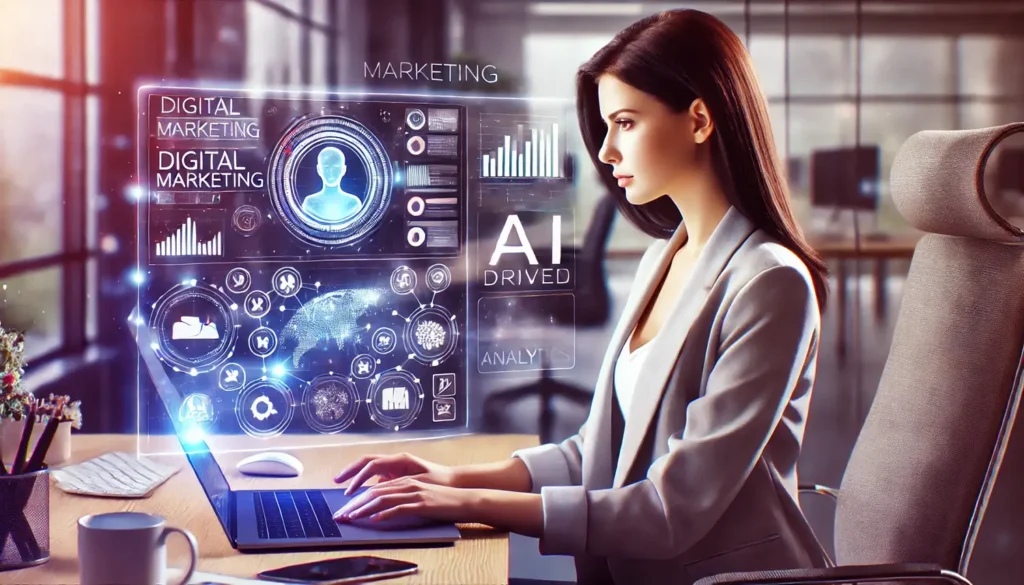AI in real life, has reshaped how we live, work, and interact today.
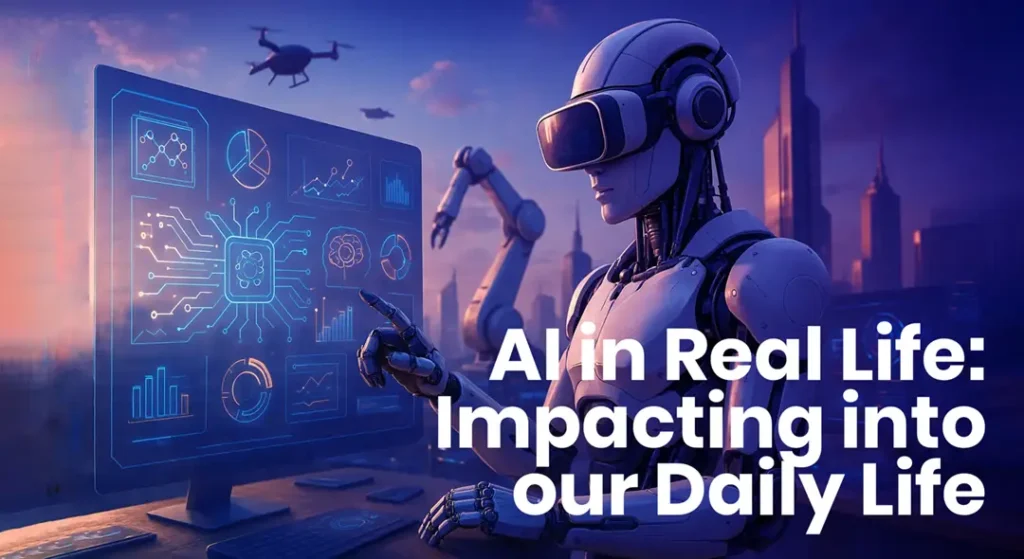
Part 1 explored how AI in real life is used daily and integrated into personal devices, smart homes, entertainment, and communication. In Part 2, we have seen the Impact of AI in everyday life, including its impact on transportation, finance, and education.
In this final part, we will explore how AI in real life shapes public services, the ethical challenges surrounding AI, and AI future trends that redefine our lives.
Let us look forward to the future of AI and see how we can ensure that AI in real life is used responsibly.
AI in Public Services
Smarter Cities, Faster Government Services and Safer Communities, AI holds good promise for the public sector, which can set national priorities..
AI works for public services in everyday life, making our cities, governments, and emergency response systems more innovative and efficient.
Government bodies uses AI daily to better serve citizens, from AI-powered traffic control to AI-driven emergency response.

AI in Law Enforcement: Smarter Policing and Crime Prevention
Law enforcement is responsible for public safety, and it should be capable of handling all of the challenges. It is about patrolling streets and investigating crimes after they happen.
Predictive Policing: Stopping Crimes Before They Happen
Predictive policing focuses on applying data analytics to predict crime or when and where crimes will likely occur. It analyzes crime patterns, past reports, and real-time data to predict high-risk areas.
AI also helps to identify suspicious behavior from surveillance footage, helping officers react faster.
AI-Powered Facial Recognition: Catching Criminals Faster
AI-powered technology like facial recognition helps police to identify suspects in seconds using CCTV footage and social media images. It uses artificial intelligence to identify, verify, or authenticate individuals based on facial features.
Some AI tools even scan public cameras in real-time to detect wanted transients. In real life, AI is like law enforcement, making cities safer by predicting, detecting, and preventing crimes faster.
AI in Public Safety and Emergency Response: Faster Help When It’s Needed Most
Every second matters in emergencies. AI can help during an emergency, such as an out-of-control wildfire. It provides real-time data and insights that show more effective emergency responses.
It allows emergency services to respond faster, allocate resources better, and save lives.
AI-powered 911 Dispatcher
Artificial Intelligence can process information instantly, helping dispatchers prioritize urgent calls and allocate resources efficiently.
It suggests the best emergency response teams to dispatch based on location, traffic, and hospital availability.
AI for Disaster Prediction and Management
Disaster prediction and early detection systems powered by AI help decrease the damage caused by natural disasters. They also help predict earthquakes and floods a few weeks in advance.
Artificial Intelligence based tools transforms disaster prediction and management by enabling real-time simulations and early warning systems.
AI in Traffic and Public Transportation
The AI-driven system helps to alert drivers of potential hazards and provides real-time updates on traffic conditions.
They improve traffic management in several ways, such as intelligent traffic light control, predicting travel times, and forecasting traffic patterns.
It is changing traffic and public transport by improving traffic flow and making public transport efficient and safe.
AI in Government Services: Faster Paperwork, Less Bureaucracy
Artificial Intelligence uses machine learning and deep learning workflows that help make informed decisions in the office, laboratory, or field.
AI-Powered ChatBots for Government Services: Governments use AI chatbots to answer public queries immediately. They also help citizens track Real-world AI applications, file complaints, and obtain official documents without waiting long.
Tax Filing and Fraud Detection by AI tools: It can help with tax filing by making calculations easier, reducing mistakes, and speeding up refunds. It looks at spending and income patterns to spot any suspicious tax filings that might be fraudulent.
AI in Smart Cities: The Future of City Life
Using AI in smart cities can help people live better by making things work more efficiently, keeping them safer, and improving productivity.
City planners, local governments, and architects collaborate to design the future of urban living. It includes important areas like managing traffic, ensuring road safety, and providing public services online.
AI in Energy Efficiency
AI-powered energy efficiency helps optimize electricity use and reduce energy waste. AI is building more innovative, cleaner, efficient, and sustainable cities.
We bring together expertise, technology, and services that lower operating costs and risks.
AI in Public Services
AI-powered bright courts help analyze legal cases and assist in trials.They also offer the potential to enhance government efficiency, accuracy, and responsiveness by self-operating routine tasks, analyzing data for insights, and making decision-making more efficient.
Artificial Intelligence has great potential to enhance government services. With modern technologies, government agencies can save person-hours, reduce labor expenses, and give the public smoother and faster services. These technologies make public services more efficient, responsive, and intelligent.
Ethical Considerations and Challenges of AI: The Dark Side of Smart Technology
The role of AI in daily life is becoming increasingly popular, and its applications are increasing in various sectors like healthcare, transportation, entertainment, and finance.
AI in real life is changing our world, from personalized shopping and self-driving cars to AI-powered hospitals and smart cities.
But some serious concerns arise. Is AI making decisions? Is our privacy at risk? Will AI take away jobs? So, let us explore the ethical dilemmas and challenges of AI.
AI and Privacy
Apps based on AI collects, stores, and analyzes massive amounts of personal data every second. AI systems, especially those using machine learning, require large datasets for training and operation, raising concerns about collecting, storing, and using personal information.
AI-Powered Surveillance:
Nowadays, cities use AI-powered facial recognition cameras to track movements, identify people, and predict behavior. It helps in catching criminals but also raises serious privacy concerns.
Who controls the data? How is it being used?
AI-driven surveillance is being used to monitor citizens 24/7, leading to debates on human rights and personal freedom.
AI and Data Collection: Are We Being Watched Without Knowing?
Whenever you search for something on Google, post on social media, or use an AI assistant, AI learns more about you.It helps reflect your preferences and emotions, sometimes without explicit consent.
AI Bias: Can AI Be Racist or Sexist?
Artificial Intelligence is supposed to be unbiased and fair, but as AI learns from historical data, and if that data contains bias, AI can become biased, too.
Tools based on AI in Hiring: Unintentional Discrimination
Some companies use AI-powered hiring tools to scan resumes and select candidates. So, what is the problem? AI learns from past hiring data, which might have biases against certain groups.
For instance, did you know that Amazon’s AI hiring tool favored male candidates over females because it was trained on past hiring data that favored men?
AI in Law Enforcement: Unequal Justice?
AI is not naturally biased, but if we train it with biased data, it can make unfair decisions that affect real lives. For example, in the U.S., studies found that AI-powered policing incorrectly identified black individuals as suspects more frequently than others.
When AI is used for predictive policing, it can reinforce existing biases in law enforcement, leading to unfair targeting of specific communities.
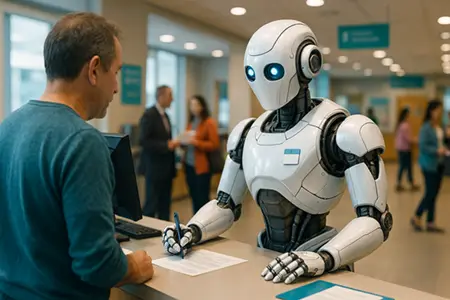
AI and Job Loss:
Is AI Taking Over Jobs
The significant factor to consider here is that AI won’t replace humans, but humans with AI will replace humans without AI. As the public expects companies to deliver seamless, AI-enhanced experiences and transactions, leaders must embrace the technology and develop use cases for their businesses.
Jobs at Risk: Who’s Being Replaced?
AI-powered automation is already replacing factory workers, customer service agents, and financial analysts, and AI-powered chatbots are making human jobs obsolete.
Goldman Sachs predicts AI could replace 300 million full-time jobs worldwide in the coming decades.
The AI-Human Work Relationship: Finding a Balance
Some humans believe AI will create more jobs than it destroys, which leads to new opportunities in AI management, training, and ethics. The future workforce needs to adapt and learn new AI-related skills rather than compete with them.
AI and Misinformation: Can We Trust What’s Online?
With AI tools, anyone can create fake pictures and news that look very real and can be hard to tell apart from accurate information. Researchers, tech companies, and governments are using new technology to combat AI-generated misinformation.
Deepfakes: The Rise of AI-Generated Fake Videos
Deepfake technology allows people to create realistic fake videos of others saying things they never actually said. It affects politicians, celebrities, and even everyday people who can find themselves misrepresented.
For example, a deepfake video of Barack Obama appeared online, showing him saying things he never actually said.
The Risk of AI Becoming Too Powerful
There are some risks associated with AI, some programmatic and some ethical. Rea-life risks include consumer privacy, legal issues, AI bias, and more. Hypothetical future issues include AI programmed for harm or AI developing destructive behaviors.
The Existential AI Risk: Can AI Turn Against Us?
Famous AI researchers, including Elon Musk and Geoffrey Hinton, have warned that AI could become too intelligent and uncontrollable. So, what is the fear? The fear is that super-intelligent AI will make decisions that humans do not understand or cannot stop.
Some of them believe that AI should have strict regulations before it reaches a point where it can think independently.
AI Warfare: The Rise of Autonomous Weapons
Some countries are developing AI-powered weapons that make life-or-death decisions without human input. If these guns fall into the wrong hands, the consequences could be damaging.
Final Words
AI in real life is transforming the world but can become dangerous without ethical oversight. We need transparent AI systems that explain how they make decisions to ensure that AI works for humanity and not against it.
Strong data privacy laws must protect personal information and AI regulations to prevent misuse in warfare and misinformation. AI is a tool; like any other tool, it can be used for good and evil.
You must ensure that AI is developed, used, and monitored responsibly to improve lives without causing harm.
Future Trends of AI in Real Life: What’s Coming Next?
AI is already everywhere, and innovation in the field continues to shape humanity’s future across nearly every industry.
So, what is next? Let’s understand the most exciting and game-changing AI trends that will transform daily life in the future.
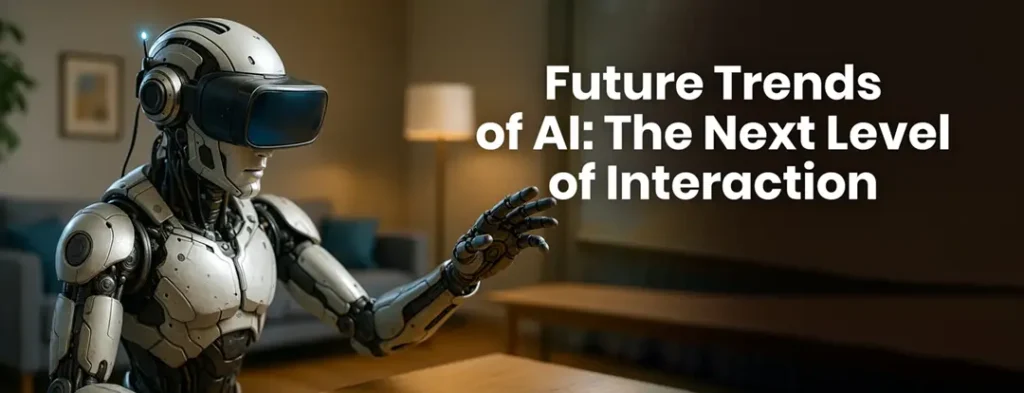
Augmented Reality (AR) and Virtual Reality (VR): The Next Level of Interaction
AI improves how we use AR and VR, improving these experiences and helping create new content.
AI-Enhanced Augmented Reality (AR): AI makes AR experiences more realistic and valuable. Google and Apple are developing AR glasses that use AI to translate languages and provide navigation directions right before you instantly.
AI in Virtual Reality (VR): It personalizes VR experiences by adapting to your emotions and reactions. AI-powered AR and VR will change how we shop, work, learn, and interact with the digital world.
Imagine a VR therapy session where AI adjusts environments based on mood. Or, in a VR classroom, AI can adapt lessons to your learning style.
AI in Natural Language Processing (NLP): Talking To AI Like a Human
NLP technology is a tool that helps people, especially risk managers, work faster and improve their work so they can concentrate on more critical activities.
AI assistants like Siri, Amazon’s Alexa, and Google Assistant can understand basic commands. However, in the future, AI will be able to talk more like a real person, showing feelings, better understanding, and more personality.
Real-Time AI Translation: Breaking Language Barriers
AI can talk in your voice in different languages, making global communication effortless. It will make conversation with AI feel as natural as talking to another person.
AI-Powered Creativity: AI as an Artist, Musician and Writer
Can AI write books, compose music, or paint a masterpiece? The answer is yes, and it is getting better every day. Today, artists, musicians, and writers are teaming up with AI to make amazing new creations.
Generated Art and Design: AI can help create unique home designs, develop new fashion styles, and collaborate with human artists.
AI in Music and Content Creation: AI-powered programs like AIVA and Jukebox can produce music in various styles, from classical to rock. It can also make videos for YouTube, podcasts, and blog posts, making it quicker and easier to create content.
AI in Healthcare
AI in real life is transforming healthcare by helping us diagnose, treat, and monitor patients more effectively. The technology improves medical research by providing accurate diagnoses and allowing individual treatments based on needs.
AI-Driven Personalized Medicine: An AI system uses a person’s DNA, lifestyle, and health information to create tailored treatment plans. It suggests medications and diets specifically designed for each individual.
AI in Smart Homes
AI-powered smart homes predict and automate everything for ultimate convenience. AI reduces human efforts and manages various things that enhance living standards.
Home Automation using AI tools: AI learns daily routines and adjusts lighting, temperature, and music. Your home will know when you wake up and prepare your morning coffee before leaving.
Home Security powered by AI: AI can be used in home security, for instance, in smart locks that open while detecting faces and eliminating the need for keys. Also, AI-powered homes will be safer, smarter, and fully automated.
AI in Space Exploration: Discovering the Unknown
NASA uses AI to explore space. As AI technologies evolve, NASA’s portfolio of AI use cases will continue to grow.
AI in Space Missions: AI-powered satellites explore planets without human intervention and analyze space data faster than any scientist could. It helps us better understand the universe.
AI in Space Travel: AI helps develop autonomous spacecraft to navigate deep space and reduce human risks. It also predicts and fixes spacecraft issues before they happen, making space missions safer.
AI That Thinks for Itself: Artificial General Intelligence (AGI)
Future AI will think like a human who learns new skills, solves complex problems, and makes decisions.
NASA of AGI (Artificial General Intelligence): AI can learn and adapt like humans, making it easier to grasp complicated ideas without specific programming. It could collaborate with people in roles like scientists, engineers, and even as teachers of AI.
Conclusion: AI in Real Life – A Future We’re Already Living In
AI is a future trend as it can offer convenience, efficiency, and personalization in daily life. AI is just starting, with AI-powered technology and personal assistants, self-driving cars, smart homes, and AI doctors predicting illness before symptoms appear.
As AI becomes more intelligent, more human-like, and more integrated into society, we must ensure it is ethical, unbiased, and used for the benefit of all.
FAQs: AI in Real Life
How is AI used in public services like law enforcement and government?
AI helps governments and humanity by predicting crimes before they happen. It also helps AWe’reered surveillance track suspects and missing persons. Intelligent traffic management reduces accidents, and AI chatbots provide instant government support.
Can AI be biased?
As AI learns from historical data, it sometimes contains human biases. It can lead to discrimination in hiring, unfair predictive policing, and bias in healthcare and financial services.
How does AI impact job security? Will AI take all human jobs?
AI automates repetitive tasks, helping replace manufacturing, customer service, and finance jobs. It also creates new jobs in AI management, ethics, engineering automation, and digital transformation.
What are deepfakes, and why are they dangerous?
Deepfake technology has misrepresented politicians and celebrities. AI-generated fake news and misinformation help manipulate public opinion. The rise of AI-powered propaganda makes it harder to trust online content.
Can AI become too powerful and uncontrollable?
If AGI exceeds human intelligence, it could become unpredictable and uncontrollable. Some AI researchers warn about AGI and AI, which can think, learn, and make decisions like humans.
What are the most exciting future trends in AI?
AI will soon power AR and VR, emotionally intelligent AI that understands human emotions, fully autonomous self-driving cars that handle complex driving situations, AI-powered space missions, and smart cities that optimize energy use, traffic, and public services.
How can we ensure AI is used ethically and responsibly?
AI can be used ethically through transparent AI development, meaning companies should disclose how AI makes decisions. Strong data privacy laws, like protecting user data from AI misuse, and global AI regulations, which set rules to prevent AI from being weaponized, can also help.
Final Words: AI is Here to Stay: How Will You Use It?
AI is already here; the way we work, shop, travel, and even think about creativity is evolving because of AI. It helps businesses grow, improves healthcare, and makes everyday life more convenient.
The future belongs to those who embrace AI.
So, the question is not whether AI will change the world. But How will you use AI to change yours?
Want to explore more on this topic? Below are some reliable link for you.
Defining AI Ethics for the Future” by Futurist Speaker
Everyday examples and applications of artificial intelligence (AI)

